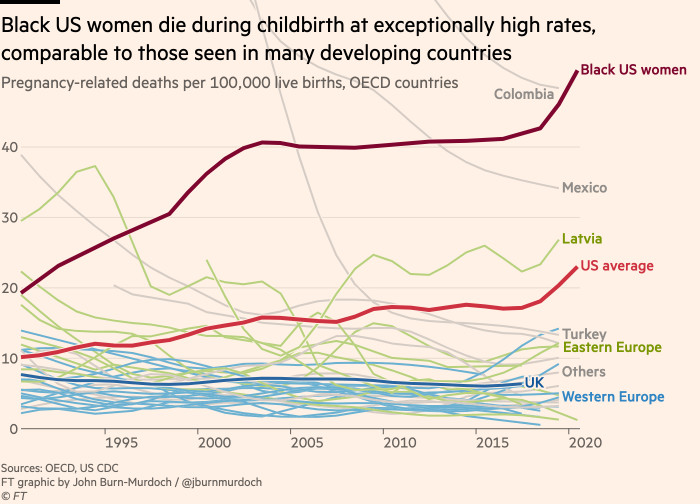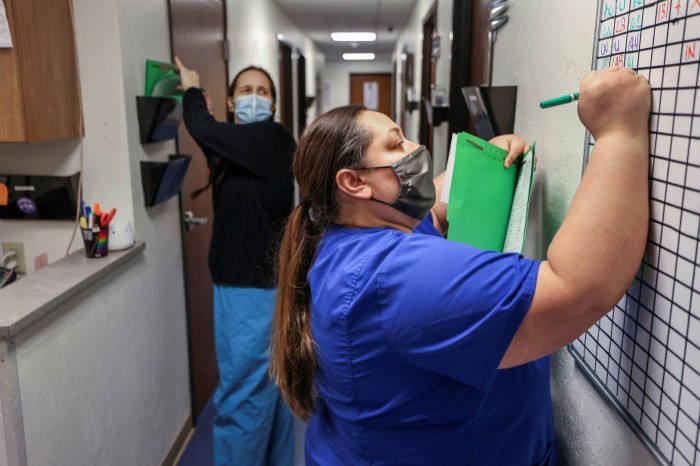Had Emma realised she was pregnant a few days earlier, things might have happened differently. She could have accessed abortion services at the Planned Parenthood clinic close to her home in Texas, which only allows abortions up to six weeks. She would have set up medical appointments rather than taking a pill to induce abortion which her friend had bought on a trip to Mexico.
In the end, she found herself watching YouTube videos produced by the international humanitarian agency Médecins Sans Frontières to guide women through the process of having a safe abortion using pills. The videos seemed designed for someone “in a very rural area or in a country where there aren’t doctors very accessible to them”, Emma thought — not for a woman living in one of Texas’s biggest cities.
The predicament 29-year-old Emma faced is one that hundreds of thousands of American women could confront if the Supreme Court enacts a draft opinion, leaked this week, that would overturn Roe vs Wade, the landmark 1973 ruling enshrining the constitutional right to abortion across the US.
If the court’s final ruling, which could be handed down as early as June, mirrors the draft opinion, a slew of conservative states are likely to further restrict abortion access. It would represent the seismic shift in US politics that liberals have long feared and religious conservatives have been working for decades to achieve.

More than half of US states would either “certainly or likely take action, pretty quickly, to ban abortion”, estimates Kristin Ford, vice-president of communications for Naral Pro-Choice America, one of the biggest groups supporting abortion access in the US. “In a matter of months, we could be looking at a dramatically changed landscape in this country for access to abortion care,” she says.
The social and political effects of such a shift would be profound in a country where the right to abortion is supported by clear majorities — and would cut across America’s racial and class divides.
But it would have an outsized impact on women of colour and those who are not healthy or wealthy enough to cross state borders to access abortion services. Healthcare providers warn of a looming medical crisis that would hit the country’s most vulnerable populations hardest.
Across the divide
Re-criminalising reproductive healthcare “will be for many people a death sentence”, says Katherine Franke, a professor at Columbia Law School. Having black women carry more pregnancies to term would put them at higher risk, given they are three times more likely to die in childbirth than white women, she adds.

In 2019, 23.8 abortions were performed per 1,000 non-Hispanic black women in the US, compared with 11.7 for Hispanic women and 6.6 for white women, according to data reported to the Centers for Disease Control and Prevention. In Mississippi, whose abortion ban after 15 weeks is at the heart of the Supreme Court case that could lead to Roe’s repeal, non-Hispanic black women accounted for 74 per cent of abortions in the same year.
Roe’s repeal “would be devastating for black women, especially those from low-income backgrounds”, says Linda Goler Blount, president of the Black Women’s Health Imperative.
Bans could also have a knock-on effect in the wider maternity healthcare system, according to Beverly Gray, the residency director of Duke University’s obstetrics programme. She says Roe’s reversal could mean worse medical care for pregnant patients, with medical providers in certain states no longer able to receive the necessary training for certain life-saving procedures because of the new state restrictions.
“If you have a patient who’s in their second trimester with severe pre-eclampsia, they’re not viable; sometimes the only way to save their life is to perform an abortion,” she says.

Over-ruling Roe would also make abortion more expensive, as more women are pushed to chase these services beyond state borders. Emma, who does not want to use her second name for fear of repercussions, discovered her pregnancy at six weeks. Unfortunately for her, this was the exact cut-off time after which abortions became illegal in Texas under a law that came into force last September. The Texas ban has no exceptions for rape or incest and is applied before many women even know they are pregnant.
The Women’s Centers — a group with abortion clinics in New Jersey, Connecticut, Georgia and Pennsylvania — has received roughly 50 calls per week from Texas alone in the wake of the ban. “We already are seeing patients from Texas at all of our centres,” says Roxanne Sutocky, the group’s community engagement director.
Emma found herself unable to face a flight or an eight-hour drive to New Mexico due to the nausea she was suffering. “I was having trouble walking around my house without wanting to vomit,” she says. So she turned to self-administered misoprostol.

The effects were “very painful”, says Emma. But fear of legal repercussions — especially after a woman in Texas faced murder accusations over a self-induced abortion before being discharged — have stopped her from contacting medical professionals: “I don’t even want to be close to that situation, so I’m going to opt to not have a follow-up appointment.”
The road from Roe
That fear was once common. For decades before the 1973 court decision in Roe vs Wade, women across dozens of states faced restrictions and outright bans in attempting to access abortions, though the procedure was legal in places such as New York.
Women living in areas of the US where abortion was prohibited or severely restricted often turned to illegal providers willing to carry out the procedures despite criminal risk and the threat of severe illness or death.
Yet while overturning Roe would be a historic event, some analysts argue there has already been a slow and steady deterioration of abortion rights in the US. Even as Roe has enshrined the right to abortion, individual states can and have passed their own restrictions. These may be subject to legal battles in federal courts over their implementation.

Emboldened by former president Donald Trump’s three Supreme Court appointments, which enabled a 6-3 split in favour of right-leaning justices, conservative legislatures have passed a flurry of abortion bans over the past few years. Only last month, Oklahoma passed a bill prohibiting abortion except in cases of life-threatening medical emergencies, the most restrictive measure yet in the US.
“Opponents of abortion . . . have come up with a number of strategies to basically hollow out Roe to the point that it means nothing,” says Franke. If Roe is overturned, “it won’t be an on and off switch”.
Rules over abortion vary widely from state to state. Some require abortions be performed after waiting periods of up to 72 hours from a first appointment. Some share information during the first visit that Sutocky says “is meant to try to deter people” from continuing with the procedure. She says The Women’s Centers faced steep costs to meet requirements imposed by Pennsylvania in 2011, which “are essentially put in place to make it burdensome . . . to provide care”.
While lawmakers argue that such rules set sound standards, abortion rights supporters believe they are intended, at best, to obstruct clinics and, at worst, to lead to their closure.

The number of independent clinics — which account for almost 60 per cent of abortions performed in the US — fell by more than one-third between 2012 and 2020, according to a report by the Abortion Care Network. By contrast, hospitals provide just 3 per cent of abortions.
Personal as political
Advocates on both sides of the ideological divide predict the issue will be a rallying call in the November midterm elections, with both parties attempting to use the court’s ultimate decision, as well as the leak itself, as a rallying cry to their base. In the case of the Democrats, it means a chance to win over moderate pro-choice independent voters, particularly women.
Naral Pro-Choice America saw its biggest online fundraising haul to date in the 24 hours after the Supreme Court draft ruling was leaked, says Ford.
Mary Anne Marsh, a Democratic strategist, says she believes a Roe reversal could motivate her party’s voters, potentially raising the chances of Democrats’ holding on to both chambers of Congress, despite President Joe Biden’s below 50 per cent approval rating. “The majority of people in this country are independent voters now, and most of them are women, and they are women in the suburbs,” she says.

Yet many opponents of abortion view overturning Roe as a long-overdue legal reckoning, disputing the notion that the right to privacy derived from the US Constitution’s 14th amendment enshrines a woman’s right to terminate a pregnancy.
“Roe vs Wade always was legally objectionable . . . It absolutely bypassed ‘we the people’ in favour of a handful of judges who operated based on their own point of view and not on legislative process,” says Kristan Hawkins, president of Students for Life of America, a group that seeks to abolish abortion. “It is a significant victory, but what it is, is righting a terrible wrong.”
Anti-abortion groups say they too will mount a renewed legislative push — looking to press state legislatures to adopt the toughest restrictions that are politically possible in their respective states, while continuing to usher more anti-abortion political candidates into office.
“Our hands have been tied for 50 years. And you know, now, I guess I kind of say everything’s on the table,” says Carol Tobias, president of the National Right to Life Committee.

A decision to overturn Roe would mark an extreme turn for a Supreme Court whose chief justice, John Roberts, has sought to avoid the sort of radical change that would lead Americans to view the body as overtly partisan and undermine public confidence in its legitimacy.
“This would be the single greatest contraction of individual liberty and equality rights in one fell swoop by the Supreme Court in I don’t know how long,” says Neil Siegel, a professor at Duke University School of Law.
For many American voters, the issue of Roe is personal as much as political. Emma says the legal changes in Texas became “a much more stark reality . . . when a law was impacting me by denying me healthcare”.
What defined her abortion was not the physical pain or the fear of legal risk. “More than anything, I had a feeling of isolation,” she says, one she did not expect to experience after overcoming internalised stigma around abortion. “That was extremely damaging to me.”
Stay connected with us on social media platform for instant update click here to join our Twitter, & Facebook
We are now on Telegram. Click here to join our channel (@TechiUpdate) and stay updated with the latest Technology headlines.
For all the latest Health & Fitness News Click Here
